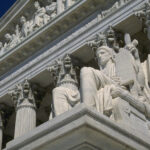 The Clinic was pleased to have had the opportunity to work with Professor Bernard Chao of the University of Denver Sturm College of Law on an amicus brief that Professor Chao filed in the United States Supreme Court this week. The brief, submitted on behalf of eighteen intellectual property law professors, supports petitioners’ request that the Supreme Court review a decision of the United States Court of Appeals for the Federal Circuit. That decision – Mentor Graphics v. Eve-USA, (Fed. Cir. March 16, 2017) – awarded patent damages against petitioners. But, as amici argue in the brief, the Federal Circuit failed to properly apportion those damages when assessing respondent’s lost profits.
The Clinic was pleased to have had the opportunity to work with Professor Bernard Chao of the University of Denver Sturm College of Law on an amicus brief that Professor Chao filed in the United States Supreme Court this week. The brief, submitted on behalf of eighteen intellectual property law professors, supports petitioners’ request that the Supreme Court review a decision of the United States Court of Appeals for the Federal Circuit. That decision – Mentor Graphics v. Eve-USA, (Fed. Cir. March 16, 2017) – awarded patent damages against petitioners. But, as amici argue in the brief, the Federal Circuit failed to properly apportion those damages when assessing respondent’s lost profits.
The brief points to a long line of precedent describing how patent damages should be apportioned – evaluating “the profits that the patent holder would have made but for the defendant’s infringement” and then “apportion[ing] the calculated profits between those attributable to the infringing features of the product, and those attributable to other, non-infringing, features.” Amici argue that the Federal Circuit’s decision below is legally deficient (insofar as it fails to follow this precedent) and represents bad patent policy (insofar as it may adversely impact high-tech defendants, which develop products covered by hundreds or thousands of patents, and improperly overcompensate patentees).
Fall term Harvard Law School Cyberlaw Clinic students Brian Lebow and Ben Shiroma worked with Chris Bavitz in the Clinic, and with Professor Chao, on the brief.
Filed in: Clinical Spotlight
Contact Office of Clinical and Pro Bono Programs
Website:
hls.harvard.edu/clinics
Email:
clinical@law.harvard.edu